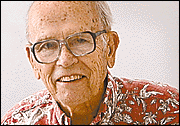


Hawaii’s World
THE late Akio Morita, I submit, may have been the Henry Ford of Japan. Ford pushed America to the forefront of auto production by making affordable cars. Through the Sony Corp., Morita led Japan to world electronics dominance. Akio Morita led
Japan in electronicsRecently I attended a small invitational reception at Punahou School to dedicate a new science lab to Morita and his wife, Yoshiko. She attended with their son, Hideo.
The traits singled out in Morita included curiosity, future-oriented and internationally-minded.
I would add optimism. Every successful man must have it. His autobiography, "Made in Japan," relates that even in the minutes after he heard the incredible news of the Hiroshima bombing he had confidence in himself and his future.
He was a young navy officer with a degree in physics and had felt for months that continuing the war was futile.
As a boy in high school he thrilled to a film on the construction of Ford Motor Co.'s Dearborn complex and saw it now as a sign of the American industrial might that made the bomb. He was brash enough to see himself as having a role in Japan's future. "I didn't know then how big it would turn out to be," he wrote.
Unlike Ford, an America First isolationist, Morita committed himself so much to internationalism that he drew criticism at home for not being Japanese enough. I argue that the reverse is true -- that Morita's internationalism was and is what Japan needs.
Hawaii was a fortunate beneficiary of his internationalism. He loved these islands as he did no other place in the United States.
He kept an apartment at Yacht Harbor Towers and loved golfing here. After his disabling stroke, he restored himself from an oceanside home in Kahala while receiving treatments from the Rehabilitation Center of Hawaii and Kuakini Hospital.
The Sony Corp. supported both Punahou and its Wo International Center with gifts of electronic equipment. Wo Center students can converse directly with students overseas.
Now Morita's family has given $1.5 million to Punahou to expand its international programs in a way that will include more public school students and another $1.5 million to build and equip the science lab where speakers envision that even music can intersect with science and math in the learning process.
"Why?" was a characteristic Morita question, reflecting his intense curiosity. His son said that as a boy he didn't like his father because his boyish "why" questions always would be answered with still more "why" questions.
I heard Morita speak here on several occasions. He told how early in Sony's development he browsed small Tokyo stores on Sundays, learned what people wanted, then had Sony try to develop products to fulfill them.
Once he raised the possibility of merging the dollar and the yen, the world's strongest currencies. Another time he criticized the growing disparity between the amount paid American executives and the compensation of our average worker. This has since widened.
On another occasion, he said he learned from Sony's first production effort in California about the wide cultural differences in their approach to work by Japanese and American workers. He adapted Sony's American operations accordingly.
Sony pioneered and steadily improved tape recorders, the transistor radio, VCRs, the Walkman and compact discs. He turned "Made in Japan" from a symbol of cheap goods into one of superb quality.
He died in Tokyo of pneumonia on Oct. 3 at age 78.
A.A. Smyser is the contributing editor
and former editor of the the Star-Bulletin
His column runs Tuesday and Thursday.